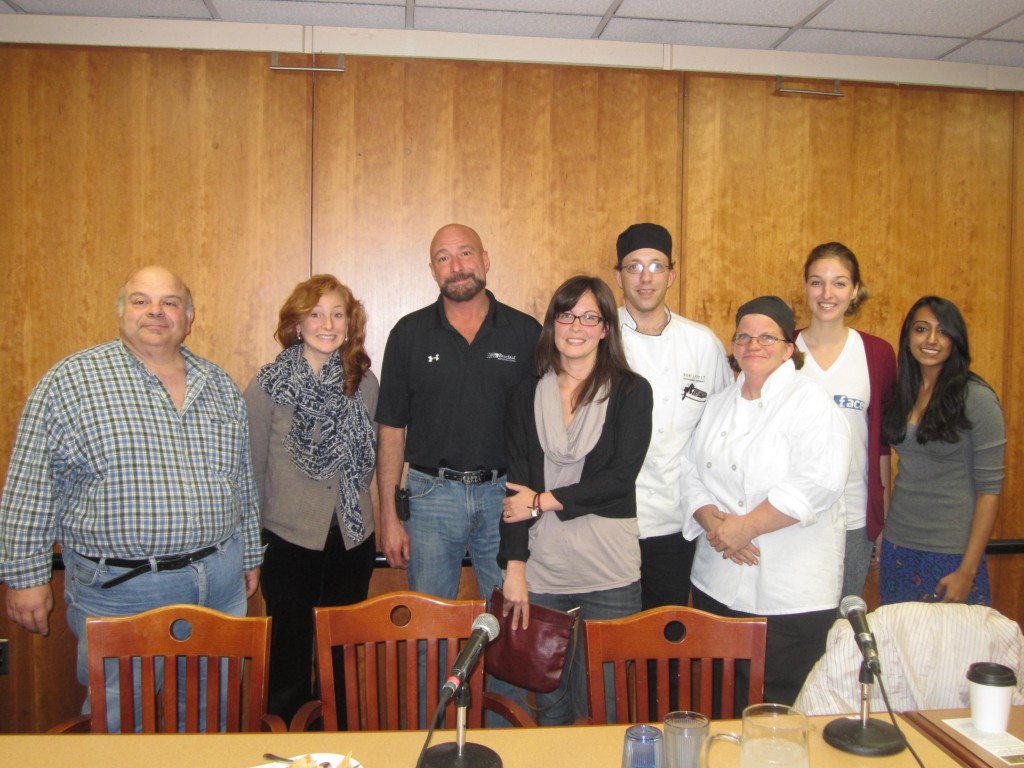Food Week at Penn Explores Making Fruits and Vegetables Cool
The University of Pennsylvania celebrated this year’s National Food Day by kicking off its third annual Food Week: You Are What You Eat, sponsored by Bon Appétit at Penn Dining and supported by Fox Leadership. One of the major goals of Food Week each year is education — raising awareness about food issues in the hopes that awareness will ultimately lead to action.
During one of the week’s events, a panel of local farmers, chefs, and Philadelphia food activists discussed the challenges of bringing healthier and more ethical food to schools and universities. Though the panelists each use slightly different approaches to this challenge, they all agreed that one of the biggest barriers to this goal is making nutritious and sustainable food appeal to students.
As Amanda Wagner, Food Policy Coordinator for Philadelphia, put it, “How do you make fruits and vegetables ‘cool’?” This challenge, which Wagner faces every day with elementary and middle school students in Philadelphia, doesn’t disappear with age. Lydia Kumpa, Bon Appétit Executive Chef at one of Penn’s cafés, is always trying to incorporate small changes into her meals to make them healthier. She shared her own frustrations via an anecdote about fried chicken. One day, early on in the semester, she made fresh, cooked-from-scratch chicken — but, rather than drowning the chicken in a piping hot vat of oil, she baked them in the oven for a healthier twist. When she put the chicken out for students to eat, she labeled it “Oven-baked fried chicken.”
“Nobody touched it!” she recalled. Apparently “oven-baked” fried chicken just didn’t appeal to student palates. So Lydia waited a few weeks. Then she made oven-baked fried chicken again, using the same recipe. The only difference was that this time, she called it plain old “Fried Chicken.” The student response? “There wasn’t a single leg or breast left! The students loved it,” she told the audience proudly. Then, with a small grin she added: “Chefs can get pretty tricky when we want to be!”

LEFT TO RIGHT: Paul Crivellaros of Country Time Farm, Zoe Lloyd of Common Market Philadelphia, Fred Recchiuti of Basciani Mushrooms, Amanda Wagner of Philadelphia’s Department of Public Health, Bon Appétit Executive Chefs Donald Stauffer and Lydia Kumpa, and student coordinators Priya Srinivasan and Molly Armstrong.
While Lydia is a fan of “stealth health” in the café, Bon Appétit Chef Donald Stauffer also emphasizes the need to educate students about how to eat both well and ethically. After all, once students leave the “all-you-can-eat-dining-utopia” (as Bon Appétit Farm to Fork partner Paul Crivellaros of Country Time Farm put it), they’ll have to make decisions on their own, and that’s hard to do if you’re not informed about food to begin with. All the panelists agreed that this — education, and raising awareness — is at the crux of the problem. Fred Recchiuti of Basciani Mushrooms put it eloquently: Because, after all, “to change behaviors, you have to change attitudes, and to change attitudes, you have to change beliefs.” And that is no small task.

Tomato mozzarella in a balsamic vinaigrette reduction, served during the Food Justice Dinner hosted by Bon Appétit and UNI.
Food Week at Penn is in large part an attempt to address this problem of education. Every day of the week had a different theme centered around various problems in our modern-day food system. On National Food Day Bon Appétit hosted a 3-course, white-tablecloth dinner on the topic of food justice. With the support of the Urban Nutrition Initiative, local high school students, activists, and Penn students discussed problems of challenges faced by low-income populations regarding access to quality food. Later on in the week, Penn’s Green Campus Partnership hosted TEDx Fruitvale, a series of videos and in-depth discussions on those who are least acknowledged in our food system — farmworkers. Dan Imhoff, author of Food Fight. also came to speak about the Farm Bill and why it matters.
Events like this are certainly a step in the right direction towards increasing consciousness about food issues, but what are some other ways to raise awareness?
